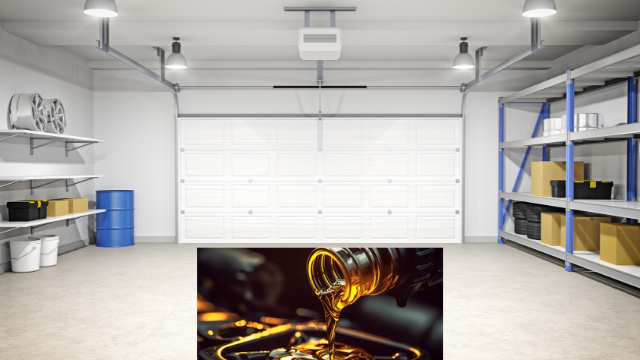Looking for the best lubricant for your garage doors? You’ve come to the right place. In this article, we’ll explore the different types of lubricants available and help you choose the one that suits your needs. From silicone-based to lithium-based, Teflon-based to synthetic lubricants, we’ve got you covered. Get ready to discover the best practices for lubricating your garage doors and ensuring smooth operation. Let’s dive in and find the perfect lubricant for your garage doors.
Types of Lubricants for Garage Doors
When choosing the best lubricant for your garage doors, it is important to consider the various types available. Proper garage door maintenance includes regular lubrication to ensure smooth operation and prevent unnecessary wear and tear. There are different lubrication techniques that can be used, depending on the type of garage door you have.
One common type of lubricant is silicone-based. Silicone lubricants are popular because they are long-lasting and do not attract dust or dirt, making them ideal for garage doors. They also provide excellent protection against rust and corrosion.
Another option is lithium-based lubricants. Lithium grease is known for its durability and ability to withstand extreme temperatures. It is a versatile lubricant that can be used on various parts of the garage door, including hinges, rollers, and tracks.
White lithium grease is another popular choice. It is a heavy-duty lubricant that provides excellent lubrication and protection against rust and corrosion. It is also resistant to water and extreme temperatures, making it suitable for outdoor use.
When selecting a lubricant for your garage doors, consider the specific needs of your door and the climate in which you live. Regular lubrication using the appropriate lubricant will help prolong the life of your garage door and ensure smooth and quiet operation.
Factors to Consider When Selecting a Lubricant
When selecting a lubricant for your garage door, there are several factors to consider. First, you want to look at the viscosity and performance of the lubricant. A lubricant with a higher viscosity will provide better protection and reduce friction. Additionally, you should consider the longevity and durability of the lubricant, as a longer-lasting product will require less frequent application. Lastly, it is important to ensure that the lubricant is compatible with the materials of your garage door to avoid any potential damage. By considering these factors, you can choose the best lubricant for your garage door. Interestingly, improper storage of aerosol lubricants can become a fire risk, making them one of the common fire hazards hidden in your kitchen or garage.
Viscosity and Performance
To select the best lubricant for your garage door, consider the viscosity and performance of the product. Viscosity testing is a crucial factor to consider when choosing a lubricant. It determines the thickness and flow of the lubricant, ensuring that it can effectively coat and protect the moving parts of your garage door. Additionally, lubricant performance analysis evaluates how well a lubricant reduces friction, prevents rust and corrosion, and extends the lifespan of your garage door system. When selecting a lubricant, keep in mind the following factors:
- Ease of application: Choose a lubricant that is easy to apply, allowing for quick and hassle-free maintenance.
- Long-lasting formula: Look for a lubricant that provides long-lasting protection, reducing the frequency of applications.
- Compatibility: Ensure that the lubricant is compatible with the materials used in your garage door system.
- Weather resistance: Opt for a lubricant that can withstand extreme temperatures and weather conditions.
- Non-drip formula: Select a lubricant that does not drip or run, preventing messy residue.
Considering these factors will help you find a lubricant that maximizes the performance and longevity of your garage door system.
Longevity and Durability
Consider the lifespan and robustness of the lubricant when choosing the best option for your garage door. Longevity and durability are crucial factors to consider, as they directly impact the performance and maintenance of your garage door. While cost effectiveness is important, it should not be the sole determining factor. Investing in a high-quality lubricant that offers long-lasting protection can save you money in the long run by reducing the frequency of lubrication and preventing costly repairs. Additionally, a durable lubricant will ensure smooth and efficient operation of your garage door, minimizing friction and wear on its moving parts. By prioritizing longevity and durability, you can maintain the optimal functioning of your garage door and prolong its lifespan.
Compatibility With Materials
To ensure proper lubrication, it is important to select a lubricant that is compatible with the materials used in your garage door. Using the wrong lubricant can lead to damage and decreased performance. Here are some material compatibility guide and lubricant selection tips to consider:
- Metal compatibility: Check if the lubricant is safe to use on metal components like springs, tracks, and hinges. Look for lubricants specifically designed for metal surfaces to prevent corrosion and ensure smooth operation.
- Plastic and nylon compatibility: If your garage door has plastic or nylon parts, choose a lubricant that is non-reactive and won’t cause any damage or degradation.
- Rubber compatibility: Some lubricants can deteriorate rubber parts, so it’s crucial to pick one that is safe for rubber seals and rollers.
- Weather resistance: Consider a lubricant that can withstand extreme temperatures and protect your garage door from freezing or sticking during winter.
- Anti-dust and anti-rust properties: Opt for a lubricant that repels dust and prevents rust formation, keeping your garage door in good condition.
Silicone-Based Lubricants
When lubricating your garage door, start by applying a thin layer of silicone-based lubricant to the moving parts. Silicone-based lubricants are a popular choice for garage doors due to their excellent lubricating properties and ability to withstand extreme temperatures. They are especially effective in reducing friction on metal-to-metal surfaces, ensuring smooth and quiet operation of your garage door.
Silicone-based lubricants offer several advantages over other types of lubricants. Firstly, they do not attract dirt and dust like oil-based lubricants do, which helps to keep your garage door clean and functioning properly. Additionally, silicone-based lubricants do not dry out or become sticky over time, providing long-lasting lubrication. This means you won’t have to lubricate your garage door as frequently, saving you time and effort.
To give you a better understanding, here is a comparison table showcasing the advantages of silicone-based lubricants over alternatives:
| Silicone-Based Lubricants | Alternatives |
|---|---|
| Excellent lubricating properties | May attract dirt and dust |
| Withstands extreme temperatures | May dry out or become sticky |
| Long-lasting lubrication | Requires frequent reapplication |
Lithium-Based Lubricants
Lithium-based lubricants are an excellent choice for garage doors due to their long-lasting lubrication benefits. These lubricants provide a smooth and friction-free operation, ensuring that your garage door functions optimally. Additionally, lithium-based lubricants are suitable for all climates, making them a reliable option regardless of the weather conditions in your area.
Long-Lasting Lubrication Benefits
Get the most out of your garage door lubrication by using lithium-based lubricants for long-lasting benefits. Lithium-based lubricants offer several longevity benefits and performance advantages that make them an excellent choice for keeping your garage door operating smoothly. Here are some reasons why lithium-based lubricants are a wise investment:
- Superior longevity: Lithium-based lubricants have a higher resistance to degradation, meaning they last longer and require fewer applications.
- Enhanced performance: These lubricants provide optimal lubrication, reducing friction and wear on moving parts, which leads to improved performance and less maintenance.
- All-weather protection: Lithium-based lubricants can withstand extreme temperatures and harsh weather conditions, providing reliable protection all year round.
- Corrosion prevention: These lubricants have excellent anti-corrosion properties, helping to prevent rust and prolong the lifespan of your garage door components.
- Versatility: Lithium-based lubricants are compatible with a wide range of materials, including metal, plastic, and rubber, making them suitable for various garage door types.
Suitable for All Climates
To ensure optimal performance in all climates, use lithium-based lubricants for your garage door. These lubricants are specifically designed to withstand extreme weather conditions and provide long-lasting protection for your garage door mechanism. Lithium-based lubricants are known for their ability to maintain their viscosity and effectiveness even in cold temperatures, making them ideal for use in colder climates. They also offer excellent resistance to heat and can withstand high temperatures, making them suitable for warmer climates as well. With their all-season capabilities, lithium-based lubricants provide consistent lubrication throughout the year, regardless of the weather conditions. By using these lubricants, you can ensure that your garage door operates smoothly and efficiently in any climate, prolonging its lifespan and reducing the need for frequent maintenance.
Teflon-Based Lubricants
For optimal performance, consider using a Teflon-based lubricant on your garage doors. Teflon-based lubricants offer several benefits that make them an excellent choice for maintaining smooth and efficient operation. Here are five reasons why you should consider using a Teflon-based lubricant for your garage doors:
- Reduced friction: Teflon has a low coefficient of friction, which means it minimizes resistance and allows the door to move more smoothly. This reduces wear and tear on the moving parts and extends the lifespan of your garage door system.
- Long-lasting: Teflon-based lubricants have excellent durability, providing long-lasting lubrication that withstands the test of time. This means fewer applications are needed, saving you time and effort in the long run.
- Water resistance: Teflon repels water, preventing moisture from seeping into the moving parts of your garage door. This helps to prevent rust and corrosion, ensuring your door operates smoothly even in damp conditions.
- Dust and dirt repellent: Teflon’s nonstick properties make it resistant to dust and dirt buildup. This reduces the need for frequent cleaning and maintenance, keeping your garage door operating at its best.
- Versatility: Teflon-based lubricants are compatible with a wide range of materials, including metal, plastic, and rubber. This makes them suitable for use on various garage door components, ensuring comprehensive lubrication for optimal performance.
Synthetic Lubricants
Consider using a high-quality synthetic lubricant for optimal performance and longevity of your garage doors. Synthetic lubricants offer several advantages over other types of lubricants. Firstly, they have a higher resistance to temperature changes, making them suitable for both hot and cold climates. This means that the lubricant will not become too thick in cold weather or too thin in hot weather, ensuring smooth and consistent operation of your garage doors throughout the year.
Secondly, synthetic lubricants have excellent lubricating properties, reducing friction and wear on the moving parts of your garage doors. This helps to extend the lifespan of the components and minimize the need for repairs or replacements.
Additionally, synthetic lubricants typically have a longer lifespan compared to other lubricants. They are more resistant to oxidation and breakdown, allowing them to maintain their effectiveness for a longer period of time.
When comparing different synthetic lubricants, it is important to consider factors such as viscosity, temperature range, and compatibility with different materials. Choose a lubricant that is specifically formulated for garage doors and follow the manufacturer’s recommendations for application and maintenance.
Best Practices for Lubricating Garage Doors
To ensure optimal performance and longevity of your garage doors, follow these best practices for lubricating them:
- Regular maintenance: Schedule regular maintenance of your garage doors to keep them in top condition. This includes lubricating the moving parts to prevent friction and wear.
- Choose the right lubricant: Select a high-quality lubricant specifically designed for garage doors. Look for one that is silicone-based or lithium-based, as these types provide excellent lubrication and protection against rust and corrosion.
- Clean the parts before lubricating: Before applying any lubricant, make sure to clean the parts thoroughly. Use a mild detergent and water to remove dirt, grime, and debris. This will ensure that the lubricant can penetrate the moving parts effectively.
- Apply lubricant sparingly: When applying the lubricant, remember that less is more. Apply a thin layer to the rollers, hinges, tracks, and springs. Avoid over-lubricating, as excess lubricant can attract dirt and debris, leading to buildup and potential damage.
- Regularly check and reapply: Garage door maintenance is an ongoing process. Regularly check the lubrication and reapply as needed, especially if you notice any signs of wear or squeaking.





